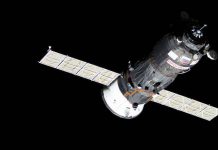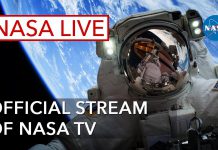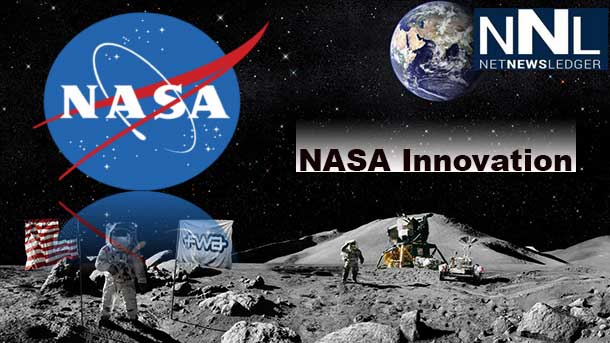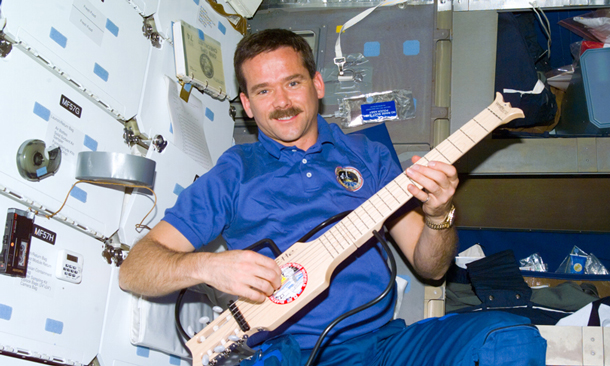 WATERLOO – Canadian astronaut Chris Hatfield has taken social media to space, and brought life aboard the International Space Station back to earth for millions of people. From tweeting to William Shatner, the timeless ‘Captain James T. Kirk’ of Star Trek fame and host of William Shatner’s Weird or What? To communication from the ISS to earth via his twitter account, Hatfield is making life aboard the ISS much more known to those of us left on earth.
WATERLOO – Canadian astronaut Chris Hatfield has taken social media to space, and brought life aboard the International Space Station back to earth for millions of people. From tweeting to William Shatner, the timeless ‘Captain James T. Kirk’ of Star Trek fame and host of William Shatner’s Weird or What? To communication from the ISS to earth via his twitter account, Hatfield is making life aboard the ISS much more known to those of us left on earth.
Hatfield is supporting research at the University of Waterloo during his mission. The astronaut will respond to questions from university students in a live space-to-ground downlink this Friday, February 15. Hadfield deployed to the ISS in a rocket launched from the plains of Kazakhstan on December 19th. He will connect with the university via downlink to be transmitted across approximately 370 km from outer space to Earth.
Canadian astronaut Chris Hatfield Twitternaut
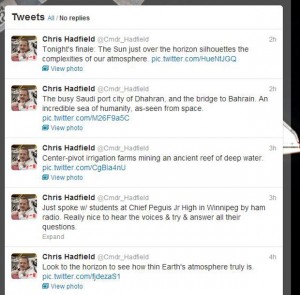
From space, Chris Hatfield through Twitter, is sharing thoughts, images, and talking directly to people via social media.
That is allowing the astronaut to reach to classroom from the elementary level to the university level. It is a degree of positive engagement that will help research and also help keep space travel and flights in the public eye.
“This Canadian Space Agency mission presents exciting opportunities for us,” said Feridun Hamdullahpur, president & vice-chancellor of the University of Waterloo.
“The honour of being the first university to participate in the downlink connection and collaborating on research with Chris Hadfield while he is in space makes this event a unique milestone for the university and our students,” added the university president.
Friday’s event, which begins at 11:30 a.m., is expected to attract nearly 700 attendees and will feature an in-person presentation by another Canadian Space Agency astronaut, Jeremy Hansen, who will provide a high-level overview of ‘Expedition 34/35’ and his experience as an astronaut.
Dr. Richard Hughson, Schlegel Research Chair in Vascular Aging and Brain Health at the University of Waterloo, will then describe the work he is doing, with Hadfield as a research subject, to examine how zero-gravity affects the circulatory system.
The Waterloo study will help researchers understand what factors might be involved in the hardening of arteries as people age.
Live Video from Space Station
Hughson is also monitoring Hadfield’s blood pressure while on the five-month mission in an effort to answer questions about why some astronauts are prone to fainting once they return to Earth after extended space flights.
“For the past 15 years, we’ve had the support of the Canadian Space Agency as we learned new details about the adaptation of the astronauts’ cardiovascular systems to space flight. We’ve been especially excited to see that these results provide insight into the normal process of aging and how exercise is so essential to good health,” said Dr. Hughson.
Canadian Space Agency
Sixteen University of Waterloo students ranging from undergrads to PhD students are prepared to pose questions to Hadfield during the 20-minute downlink which will follow the live presentations. Jaclyn Blacklock, a PhD candidate who explores work and health-related issues, plans to ask Hadfield how he is managing work-life balance during the mission.
Canadian astronaut Chris Hatfield Tweets to Captain Kirk
Hadfield has been tweeting from space, most famously so far with fellow Canadian William Shatner who played Captain James T. Kirk in the original TV series Star Trek. Hadfield, who will be Commander of the space station starting in March, has conducted other downlink conversations with such institutions as hospitals and schools, and has provided photography of the view from space.
Hadfield was born in Sarnia and grew up in Milton, Ontario and is noted for having performed the first Canadian spacewalk in 2001, soaring over British Columbia as he attached Canadarm2 to the International Space Station. Later in that mission, he was at the controls of the Canadarm as it received Canadarm2’s launch cradle in “Canada’s first robotic handshake in space.”
The special event at the University of Waterloo begins at 11:30 a.m. Friday, Feb. 15 in the Humanities Theatre at Hagey Hall and free tickets to the event are now fully booked. Overflow viewing in a separate venue and wait line registration information is available at: downlink registration. A live webcast of the event will be available for viewing by visiting Hadfield livestream. Join the conversation on twitter using #AskHadfield or follow along @uWaterlooLIVE

